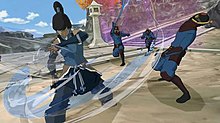
Avatar: The Last Airbender, also known as Avatar: The Legend of Aang in some regions, or simply Avatar or The Last Airbender, is an American animated fantasy action television series created by Michael Dante DiMartino and Bryan Konietzko and produced by Nickelodeon Animation Studio.
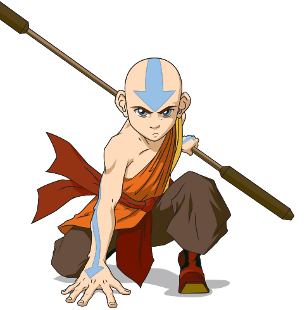
Avatar Aang, or simply Aang, is the title character and protagonist of Nickelodeon's animated television series Avatar: The Last Airbender, voiced by Zach Tyler Eisen. Aang is the last surviving Airbender, a monk of the Air Nomads' Southern Air Temple, and the youngest ever airbending master.

Avatar: The Last Airbender: The Video Game is a 2006 action-adventure video game based on the animated television series of the same name. It was released for the Game Boy Advance, Microsoft Windows, GameCube, Nintendo DS, PlayStation 2, PlayStation Portable, Wii, and Xbox. The game was a launch title for the Wii in North America. All versions feature an original story set between Book 1 and Book 2 of the series, except for the Microsoft Windows version, which features a different story, based on Book 1, and different gameplay.
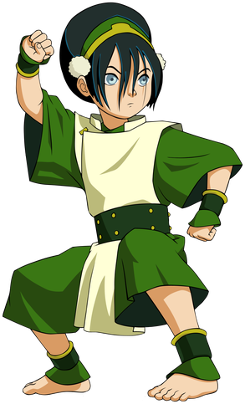
Toph Beifong is a fictional character in Nickelodeon's animated television series Avatar: The Last Airbender and The Legend of Korra, voiced by Michaela Jill Murphy in the original series and Kate Higgins and Philece Sampler in the sequel series.

Michael Dante DiMartino is an American animator, producer, writer, and director. He is best known, together with Bryan Konietzko, as the co-creator of the animated TV series Avatar: The Last Airbender and The Legend of Korra, both on Nickelodeon.

PlatinumGames Inc. is a Japanese video game developer that was founded in October 2007 as result of a merger between two companies, Seeds Inc. and Odd Inc. Shinji Mikami, Atsushi Inaba, and Hideki Kamiya founded Seeds Inc. after the closure of Capcom's Clover Studio, while Odd Inc. was founded by Tatsuya Minami. A year after the studio was founded, video game publisher Sega announced that it would be publishing four intellectual properties developed by the company: MadWorld, Infinite Space, Bayonetta, and Vanquish. Their partnership later extended to include Anarchy Reigns. Most of these games were met with positive reception. Over the years, PlatinumGames had developed an expertise in action games and one of their key philosophies was that the team would not follow conventional game design concepts.

Avatar: The Last Airbender – Into the Inferno is a 2008 video game based on the Nickelodeon animated TV series Avatar: The Last Airbender. Like the previous two games which were set in the first and second seasons, the game's setting is based upon the show's third and final season. The Wii version was released on October 13, 2008 in North America and on November 1, 2008 in the UK. A PS2 version is also available and was released on October 31, 2008 in the UK.

The Legend of Korra, also known as Avatar: The Legend of Korra, or more rarely simply as Korra, is an American animated fantasy action television series created by Michael Dante DiMartino and Bryan Konietzko for Nickelodeon. A sequel to DiMartino and Konietzko's previous series Avatar: The Last Airbender, which aired from 2005 to 2008, the series ran for 52 episodes ("chapters"), separated into four seasons ("books"), from April 14, 2012, to December 19, 2014. It has been continued as a comic book series.

Avatar Korra, commonly simply known as Korra, is the title lead character in Nickelodeon's animated television series The Legend of Korra, in which she is depicted as the current incarnation of Raava's Avatar—the spiritual embodiment of balance and change—responsible for maintaining peace and harmony in the world. She is the immediate reincarnation of Avatar Aang. The character was created by Michael Dante DiMartino and Bryan Konietzko and is voiced by Janet Varney, and by Cora Baker as a child.

Tenzin is a major character in Nickelodeon's animated television series The Legend of Korra, which aired from 2012 to 2014. The character and the series, a sequel to Avatar: The Last Airbender, were created by Michael Dante DiMartino and Bryan Konietzko. He is voiced by J. K. Simmons. Tenzin's father, Aang, was the Avatar who preceded Korra and kept world peace by preventing the Fire Nation from taking over the world during the Hundred Year War, which occurred about seventy years before the beginning of The Legend of Korra. Tenzin's mother, Katara, greatly assisted Aang in his efforts to save the Earth Kingdom from destruction. Tenzin is the youngest of the three children of Aang and Katara.

Book One: Air is the first season of the American animated television series The Legend of Korra created by Michael Dante DiMartino and Bryan Konietzko. Consisting of twelve episodes, it was initially intended to be a stand-alone epilogue miniseries sequel to Avatar: The Last Airbender before the series was expanded to an order of four seasons ("books") of fifty-two episodes ("chapters") in total. Book One: Air aired from April 14 to June 23, 2012, on the Nickelodeon channel in the U.S., and is broadcast in other countries beginning in June 2012.

Bayonetta 2 is a 2014 action-adventure hack and slash video game developed by PlatinumGames and published by Nintendo. It is the sequel to the 2009 game Bayonetta, and was directed by Yusuke Hashimoto and produced by Atsushi Inaba, Akiko Kuroda, and Hitoshi Yamagami, under supervision by series creator Hideki Kamiya.
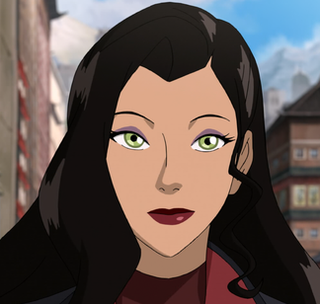
Asami Sato is a major character in the Nickelodeon animated television series The Legend of Korra (2012–2014). The character and the series, a sequel to Avatar: The Last Airbender (2005–2008), were created by Michael Dante DiMartino and Bryan Konietzko. She is voiced by Seychelle Gabriel. The series' final scene, indicating the beginning of a romantic relationship between Asami and the female lead character, Korra, was unprecedented in its representation of LGBT persons in western children's television, with the characters' relationship fully explored in the comic continuations Turf Wars (2017–2018), Ruins of the Empire (2019–2020), and Patterns in Time (2022–2023).
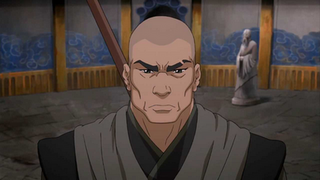
Zaheer is a recurring character in Nickelodeon's animated television series The Legend of Korra. He serves as the main antagonist of Book Three: Change, and his actions have lingering effects on Avatar Korra and the series' plot in the following book. The character was created by Michael Dante DiMartino and Bryan Konietzko and is voiced by Henry Rollins. The character was well received by critics as a complex and intimidating villain.

Transformers: Devastation is an action hack and slash video game based on the Transformers franchise developed by PlatinumGames and published by Activision. In the game, players control five Autobots as they battle to stop a Decepticon plot to turn the Earth to metal. Several creatives who worked on past Transformers media, including writers, actors, and musicians, contributed to the game's development.

Teenage Mutant Ninja Turtles: Mutants in Manhattan is an action hack and slash video game developed by PlatinumGames and published by Activision. It is inspired by IDW Publishing's Teenage Mutant Ninja Turtles comic book series. It was released for PlayStation 3, PlayStation 4, Windows, Xbox 360, and Xbox One on May 24, 2016. Less than eight months after its release, the game was removed from sale from all digital storefronts on January 3, 2017. This was the last Nickelodeon game to be published by Activision, with the rights for the Teenage Mutant Ninja Turtles video game series being given to Dotemu.

Avatar: The Last Airbender, or simply Avatar, is an American multimedia franchise consisting of two animated television series, a live-action film, comics, books, video games, home media, and soundtracks. The franchise began with the animated television series Avatar: The Last Airbender, which aired on Nickelodeon from 2005 to 2008. The series is set in an Asian-inspired fantasy world in which some people can telekinetically manipulate one of the four classical elements: air, water, earth, or fire. Only the titular "Avatar" can bend all four elements and is responsible for maintaining balance in the world.
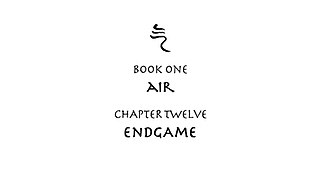
"Endgame" is the twelfth and final episode of the first season of Nickelodeon's The Legend of Korra. Production occurred under the code 1123 and the episode was directed by Joaquim Dos Santos and Ki Hyun Ryu and written by the Avatar franchise creators Michael Dante DiMartino and Bryan Konietzko. "Endgame" aired on June 23, 2012, and was animated by Studio Mir.

Avatar Legends: The Roleplaying Game is a fantasy tabletop role-playing game produced by Magpie Games. It is set in the world of the animated television series Avatar: The Last Airbender and The Legend of Korra, and takes place in five different time periods. It sees players take the roles of martial artists, technological experts, or benders – people who can manipulate one of the four classical elements – who fight for balance in the world while also working towards their own goals and struggling with inner balance, represented by opposing ideals held by a character.

